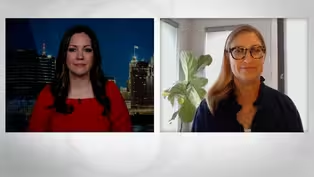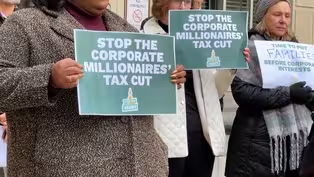NJ Spotlight News
NJ Spotlight News: April 23, 2024
4/23/2024 | 26m 46sVideo has Closed Captions
Watch as the NJ Spotlight News team breaks down today’s top stories.
We bring you what’s relevant and important in New Jersey news, along with our insight. Watch as the NJ Spotlight News team breaks down today’s top stories.
Problems playing video? | Closed Captioning Feedback
Problems playing video? | Closed Captioning Feedback
NJ Spotlight News is a local public television program presented by THIRTEEN PBS
NJ Spotlight News
NJ Spotlight News: April 23, 2024
4/23/2024 | 26m 46sVideo has Closed Captions
We bring you what’s relevant and important in New Jersey news, along with our insight. Watch as the NJ Spotlight News team breaks down today’s top stories.
Problems playing video? | Closed Captioning Feedback
How to Watch NJ Spotlight News
NJ Spotlight News is available to stream on pbs.org and the free PBS App, available on iPhone, Apple TV, Android TV, Android smartphones, Amazon Fire TV, Amazon Fire Tablet, Roku, Samsung Smart TV, and Vizio.
Providing Support for PBS.org
Learn Moreabout PBS online sponsorship>> major funding for NJ Spotlight News is provided in part by an JN insurance group, serving the needs of residents and businesses for more than 100 years.
Horizon Blue Cross Blue Shield of New Jersey, an independent licensee of the Blue Cross Blue Shield Association.
Independent realtors, the voice of real estate in New Jersey.
More information is online.
>> tonight, proposed corporate transit fee.
It would force multimillion dollar companies to ante up to rescue NJ transit.
>> It puts New Jersey in a situation of not being competitive.
>> Plus, New Jersey is trying to become the first state to offer online ordering and home delivery of groceries, baby formula, and other daily needs for wic recipients.
>> Grocery ordering online does not seem like something privileged but for some people it really isn't an option and it's a thoughtful way of opening the program to more people.
>> New Jersey goes Hollywood, ramping up efforts to make towns in the state film ready.
And celebrating Passover.
Jewish communities in New Jersey gather with heavy hearts for their first Seder since the Israel-Hamas war broke out.
>> As hard as it feels to come together in a celebratory way, it is an active secret defiance to do so and is our Jewish -- an act of defiance to do so and is our Jewish obligation.
>> NJ Spotlight News begins now.
>> from NJPBS Studios, this is NJ Spotlight News with Rihanna Vannozzi.
>> good evening and thanks for joining us.
Governor Murphy's proposed corporate transit fee may be the biggest flashpoint in this year's state budget negotiations.
The 2.5% tax would hit New Jersey's 600 top running companies with the money going to help New Jersey transit's massive budget hole.
The idea is getting criticism from a number of sectors, including the business community , which argues it will make New Jersey a much less enticing place.
Brenda Flanagan reports.
>> it puts New Jersey in a situation of not being competitive.
Brenda: Business lobbyists are pushing back against Governor Murphy's proposed corporate transit fee, a surcharge designed to rescue NJ transit from plunging off a fiscal cliff and keep the agency on a stable funding track.
The extra fee atop New Jersey's current 9% corporate tax could raise up to $1 billion a year.
Business leaders instead suggested using New Jersey's fast-growing sales tax revenues to fund transit.
>> Sales tax increases every year by nature of inflation.
Costs those up and therefore sales tax goes out.
If you dedicated the future funding scream -- stream of the increase in sales tax, you would find a good revenue source.
Brenda: New Jersey's sales tax is presented to generate an extra $.5 billion next fiscal year, and raising the tax rate to its former 7% could crank out even more cash for NJ transit, says the president Michelle.
>> There is the opportunity to go back to 7% and dedicate that amount.
>> We cannot afford to continue to put working families on the hook.
We are facing many fiscal crisis ses and transit is one of them.
Brenda: Advocates call progressive tax is unfair because they bite a larger part of earnings from lower income folks.
The charge is that big corporations can afford to pay a 2.5% surcharge.
>> Why are we continuing to put the burden on the backs of regular New Jerseyans instead of asking corporations like Amazon, Walmart, and Bank of America to pay their fair share and invest in the types of programs and services like NJ transit?
Brenda: Even Democrats have expressed doubt about funding transit with corporate taxes, which some call a volatile revenue source that might fall short of NJ transit's needs.
>> My concern is it's not going to reach the level you think it might end you are going to have still a problem year-to-year for the next couple of years.
>> If New Jersey transit is looking for stability and a dedicated funding stream, this may not be the tax to go for.
Brenda: Business leaders say they want to see an audit at NJ transit.
The agency is spending more than $6 million on a feasibility study looking for up to 20% in budget cuts and some service adjustments.
A coalition of New Jersey businesses claims the governor reneged on his promise to let New Jersey's 2.5% corporate tax surcharge expire by proposing this new transit fee on 600 companies earning at least $10 million a year.
It's retroactive to January 1.
>> We are two quarters into this already so the clawback effect of this fee is going to be very impactful on most companies.
That's going to trickle down.
I think this entire tax has a lot to do with pushing people out of New Jersey, not just keeping them in.
>> I have a hard time believing that companies like Amazon and Walmart are all of a sudden going to pull up stakes and hightail out of New Jersey simply because we are asking them to pay a tax, which they have already been paying last year.
Brenda: Analysts warn if New Jersey again and ask the nation's highest corporate tax, some companies could decide to grow their investments elsewhere.
Brenda Flanagan, NJ Spotlight News.
Briana: State health leaders want to make access easier for the 240,000 people here part of the federally funded WIC program, which provides healthy food, baby formula, and other necessities to low income moms and their children by offering for the first time ever online grocery shopping and delivery.
If approved, New Jersey would be the first state to offer that option.
Groups that work with struggling families say it would make a big difference.
But the changes require about $3 million in taxpayer funds and legislative approval.
Health care writer Lilo stated joins me with the details.
I am curious, what's the rationale behind making this online option available?
>> my understanding, and the commissioner talked about it as modernizing the WIC program, this is a program that has been around for decades and proved successful.
The thinking is there are so many more people who could benefit but don't because of a missing link in the chain.
Maybe they don't have a bus pass or don't have access to a car or these stories in their neighborhood don't have the products they need better in walking distance.
I think this is like trying to close those gaps that as reporters we see so often in programs that are well-intentioned and set up to succeed, but bass out on some people because of those tiny disconnects.
Briana: During the pandemic we saw a lot of online ordering options expand, groceries or other items.
WIC's infant formula, breast-feeding necessities, and foods for moms and their kids, low income moms.
Raven: There are other referrals and connections to other programs, so the local WIC offices do a lot.
It became so common to online order during the pandemic, we forget this is a privilege many of us have that we don't even think of -- grocery ordering online does not seem privileged, but for some people it isn't an option.
It's a thoughtful way of opening the program to more people.
Briana: They need about $3 million and approval from the legislature.
Where does that stand and who do they feel it will help most out of the moms using this program?
Lilo: If you look at federal statistics, more than half nationwide of WIC users are actually the children.
It is new moms of course but also children in poor families.
This might be on top of other benefits they would receive, maybe food stamps or SNAP.
I am not a mother but from talking to mothers, I understand with a newborn it is really hard.
You have so much going on.
The ability to get food delivered sound like it could be a lifeline.
Clearly that is going into it because they have framed it under the wider efforts the state is doing to improve maternal health and maternal infant health care.
Briana: You laid out what the Department of Health Commissioner put as the positives for having a program like this, but did you hear from advocates about where there might be complications?
Lilo: Right.
When you talk to the people doing this work on the front lines, they point out all kinds of potential wrinkles, including a lot of poor families don't have good Internet access.
There are also questions about families that live in facilities and buildings that might be secure, where nobody can get in from the outside to drop off groceries.
If they can't get downstairs, they have missed that connection.
There is a concern about groceries being stolen or misplaced, so the state has to think through the details but it's an interesting proposal that the legislature has to weigh.
Briana: They will need to do that by July 1 when the budget needs to be finalized.
Thanks so much.
Disparities also exist within other programs available to New Jersey moms, despite experiencing mental health issues at twice the rate of white mothers, black mothers are twice as unlikely to get help for maternal mental health issues.
Advocates say that is due to factors like financial barriers and fear of stigma, involvement of child welfare services.
Joanna Gagis visited Care Plus NJ's eternal and family center to see how they are working to address until health for black women before, during, and after pregnancy.
>> Maternal mental health conditions are the leading cause of maternal death, so if we are not addressing maternal mental health, not just physical, if we are not addressing the mental health, we are doing a major disservice to not only black moms, but moms of all colors in New Jersey.
Brenda: Maternal mental health has come into focus as a major contributor to the staggering disparities that exist in maternal and infant deaths.
That's why Care Plus, a mental health care provider, has created the maternal and family center for women who need that support but too often don't get it.
>> about 75% of women struggling with changes in their mental health before, during, or after pregnancy do not get treatment.
Joanna: Black moms are even more likely to go untreated yet also more likely to suffer from depression or other mental health concerns.
>> One in five women will experience some form of maternal mental health condition over the course of the prenatal or postpartum period.
For black women, it is two times higher than white women, and 50% of black women during the prenatal and postpartum period, will experience a mental health condition related to pregnancy and postpartum.
Less than half will access treatment.
Joanna: She points to a complicated combination of causes that leads to higher rates of illness and lower rates of treatment for black women.
>> What stands out most is the history of structural racism, implicit bias, definitely plays a role in how black mothers and birthing people are treated, whether it is medical or mental health facilities when they are reaching out, not feeling understood, not feeling heard.
Joanna: Care Plus is working to strengthen relationships with other care providers to let them know they are here as a resource for mental health care services, which are covered by insurance.
>> We are getting referrals from OB/GYN's, from hospitals, giving a history of what they are going through.
They are seen within about four to five days with their first intake.
At the end of the day, we hear them out, we try to understand where all this is coming from.
How is it coming out within their lives?
From there they get assigned a therapist.
We can see whether they would need medication or if they would benefit from family therapy as well.
Joanna: Care Plus is now offering other providers training to improve their screening process to better identify mental health concerns their patients may have.
>> And also what to do if somebody does yield a positive screening, how to access the care so we have that strong continuum of care across the board.
>> No judgment, our main goal is to help these moms get through this time.
Joanna: Patients can begin receiving care here from the early planning -- early family planning stages to two years postpartum and after that they can be referred to a mental health care provider within the Care Plus system.
>> support for the medical report is provided by Horizon Blue Cross Blue Shield of New Jersey, an independent licensee of the Blue Cross Blue Shield Association.
Briana: In our spotlight on business report, rolling out the red carpet for Hollywood.
Long before the West Coast made its name as home to the film industry, New Jersey was the movie capital of the world.
The Murphy administration has been working for several years to reclaim that title, offering tax incentives to film companies and making trips to L.A. to promote the incentives.
Today these state held a workshop for counties and towns, getting them up to speed with the benefits of on location filming in their communities and what they need to do to be film ready.
>> Ben Kingsley, Timothée Chalamet.
>> just some of the many celebrities Steve garlic says have helped pick New Jersey an iconic setting for international box office hits.
He says the film industry, which started in the garden state, has been a major boost to the economy.
>> About $700 billion is the revenue for the state from film production.
That comes from attracting some 95 features in 2022, 21 major television series and specials.
Over 1172 shooting days in the state in a single year and creating over 14,000 jobs.
Reporter: Now the New Jersey economic development Authority and New Jersey motion picture commission are showing municipalities across the state how they can attract production in their communities, hosting this film ready workshop.
>> It's a five-step program that educates municipalities on the basics of motion picture production and enables cities and towns to accommodate location filming and market to communities as filming destinations.
The program sets standards for attracting filmmaking and positions the city as a top production destination.
It is our goal to establish certified communities in all of our 21 counties that can assist on television production crews at a local level, which will better serve their communities and the motion picture industry for years to come.
>> It's a great opportunity for people to see us in different lights and understand others through a different lens.
Reporter: The president and CEO of the Morris County economic alliance credits the film industry for encouraging inclusivity and opportunities within Morris County.
>> Last year the County got $1.4 million in incentives.
We have 166 filming locations and over 70 different businesses , mainly small businesses, signed up on the directory.
>> The governor last week said over and over that for every one dollar the state spends to keep entertainment here, six dollars to eight dollars come back into the local economy.
Reporter: John Crowley also says having production crews in communities can be a huge plus for anyone looking for a job.
>> We are not just talking about PAs, we are talking about -- we have people in trade schools right now, carpenters or people skilled in making things with their hands.
That's an entré position into the art department or props.
What about people who have an interest in fashion, wardrobe, makeup, hair?
People with business degrees?
People in the entertainment industry who don't have a clear path forward?
The production offices are always looking for people who have an accounting background.
Reporter: As the film industry expands, its revenue is expected to soon reach the billion dollar threshold, proof of the garden state's place as a major filming hub into the future.
For NJ Spotlight News, I am Melissa Rose Cooper.
Briana: Stocks climbed today as earnings kick into high gear.
Here is where the markets closed.
♪ An update on Wall Street Journal reporter and New Jersey native Evan Gershkovich.
A Moscow court rejected his appeal seeking to end his pretrial detention, meaning the 32-year-old from Princeton will remain in jail on espionage charges until at least June 30.
Gershkovich was detained by Russian authorities a year ago.
His family friends, the journal, and the U.S. government have defended his innocence and denied espionage allegations.
Members of the media were allowed inside the courtroom to see him today for the first time in months.
Gershkovich looked relaxed inside the defendant's box, cracking a smile and laughing at times while talking to his legal team.
Russian officials tell the Wall Street Journal confidential discussions about a prisoner exchange are taking place between the Kremlin and Washington.
Gershkovich's loved ones appeared to be staying strong.
Last night his close friends posted on x that his family saved a seat for him at their Passover Seder dinner.
Many Jewish communities gathering for Passover this year are leaving empty seats to symbolize the Israeli hostages who remain in captivity with Hamas.
The holiday is playing out against the backdrop of the Israel-Hamas war in Gaza.
It's a time of heightened emotions and fear.
As Ted Goldberg reports, despite differences and heavy hearts, the more than 1000 year tradition goes on.
Ted: On Passover, Jewish people ask why is this night different from other nights?
Amid six months of war in Israel and protests on campuses, I asked Rabbi Mark Katz why is this Passover different from other Passover's?
>> It is a scary time, but Jewish history is scary.
Part of the Passover Seder is reminding ourselves that every generation people are seeking our destruction.
Ted: Rabbi Katz has led his temple for six years.
Concerns from his congregation include how to break bread while avoiding arguments.
>> People who might be in different political places than their kids, who might be in different places with this war.
Ted: The war is a difficult subject and avoiding discussion around Israel during a Seder is next to impossible.
>> Not only the fact that we end with the words next year in Jerusalem but that we are constantly harkening back to ancient times in the temple, that we ask God to defend the Jews against those who seek our destruction.
>> The liberation from Egypt is really the Academy of who we are, because we are constantly being liberated.
Briana: Stanley Keel says going to Seder and hearing the story of Passover is a connection to his roots.
This year's Seder had a major twist.
>> The change to the story is that Jews have joined with the Palestinians as also being held captive.
My wish and hope with Passover is praying that we can -- our prayers will help free these people.
>> The fact that there are still hostages with no sign of them coming home anytime soon, the messages that we read at our Passover Seder's around our table feel so poignant this year.
Ted: Lucy is the senior cantor at a temple in Short Hills.
>> As hard as it feels to come together in a celebratory way, it is an act of sacred defiance and our Jewish obligation.
Ted: She is concerned about reports of anti-Semitic language used at protests on some college campuses.
While groups have called for divestment from Israel at Rutgers without criticizing Jewish people as a whole, she has heard reports from other schools with protesters using disturbing language.
>> They are saying October 7 is going to happen 10,000 times.
That would mean 12,000 Jews would die.
>> I find when something happens in Israel, there are people who become emboldened to say things they normally wouldn't.
Ted: Rabbi Katz says the problem is when people conflate Jewish people with Israel's government.
>> Criticizing Israel is right.
They have to draw a distinction between the Israeli government, the Israeli people, and Jews.
If you lump those things, you get close to antisemitism.
Ted: Yesterday the Chancellor's office at Rutgers put out a letter saying they were troubled about the unsettling rise in the number of biased reports, particularly antisemitism on campuses.
They also said Rutgers would create an advisory Council for Jewish life, coming as Jewish people continue so the rating Passover over eight days and nights.
I am Ted Goldberg.
Briana: That does it for us tonight, but don't forget to download the NJ Spotlight News podcast so you can listen anytime.
I am Briana Vannozzi.
For the entire NJ Spotlight News team, have a great evening.
We will see you back here tomorrow night.
>> New Jersey education Association, making public schools great for every child.
RWJ Barnabas health, let's be healthy together.
And New Jersey realtors, the voice of real estate in New Jersey.
More information is online at NJrealtor.com.
>> Look at these kids.
What do you see?
I see myself.
I became an ESL teacher to give students what I wanted when I came to this country.
The opportunity to learn, to dream, to achieve, a chance to be known and to be an American.
My name is Julia and I am proud to be an NJEA member.
♪
Addressing mental health needs of Black mothers
Video has Closed Captions
Clip: 4/23/2024 | 4m 27s | Providing care for patients from family-planning stage through postpartum (4m 27s)
Home delivery, online shopping for NJ users of WIC nutrition program?
Video has Closed Captions
Clip: 4/23/2024 | 4m 52s | New Jersey would be the first state to offer grocery delivery as part of the critical, federally fun (4m 52s)
Jewish communities celebrates Passover amid war in Israel
Video has Closed Captions
Clip: 4/23/2024 | 4m 6s | NJ rabbis say congregants are concerned, but vow to celebrate Passover (4m 6s)
NJ towns strive for big screen dollars
Video has Closed Captions
Clip: 4/23/2024 | 4m 22s | Film and TV production generated more than $700 million in revenue for NJ in 2022 (4m 22s)
Push to use sales tax revenue to help fund NJ Transit
Video has Closed Captions
Clip: 4/23/2024 | 4m 27s | Business leaders argue against Murphy proposal to use new corporate fee (4m 27s)
Providing Support for PBS.org
Learn Moreabout PBS online sponsorship
- News and Public Affairs

Top journalists deliver compelling original analysis of the hour's headlines.

- News and Public Affairs

FRONTLINE is investigative journalism that questions, explains and changes our world.












Support for PBS provided by:
NJ Spotlight News is a local public television program presented by THIRTEEN PBS




